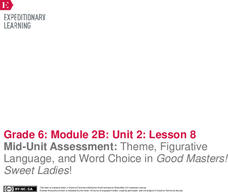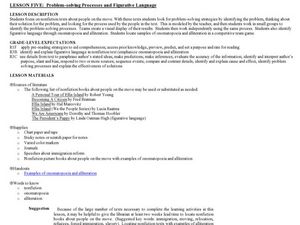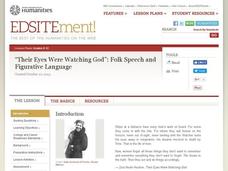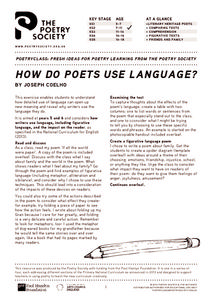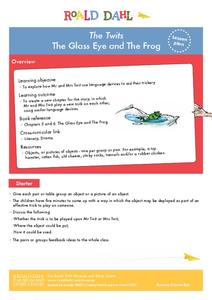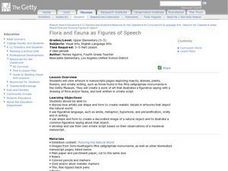EngageNY
Grade 10 ELA Module 4: Unit 2, Lesson 5
When Macbeth says, "Nature seems dead," he uses personification. Using the resource, scholars complete a Quick Write to analyze the impact of figurative language on the mood of Shakespeare's Macbeth. Pupils also participate in an...
EngageNY
Mid-Unit Assessment: Theme, Figurative Language, and Word Choice in Good Masters! Sweet Ladies!
Time to show what you know. Scholars complete a mid-unit assessment to demonstrate their learning from the past lessons. Learners work independently to identify the theme and answer questions about Pask, the Runaway. They also examine...
Curated OER
Problem-Solving Processes and Figurative Language
Nonfiction texts about people on the move provide young readers with an opportunity to examine not only the problem-solving strategies employed by immigrants, but to also find examples of figurative language these writers use to tell...
Curated OER
Metaphor Meanings
Help your young writers decipher the literal meanings of metaphors. After reading several metaphors, learners write the real meanings that the phrases are describing. Use this resource in a figurative language lesson, or when preparing...
K12 Reader
What Is a Simile?
As fun as a barrel of monkeys, this figurative language worksheet will engage your students in learning to write similes. Asking them to first think of adjectives describing the six nouns listed on the page, this exercise has young...
Scholastic
Quick as a Cricket Lesson Plan
Teaching young learners about similes is easy as pie with this primary grade language arts instructional activity. Following a class reading of the children's book, Quick as a Cricket by Audrey Wood, young readers learn the definition of...
EngageNY
Grade 10 ELA Module 1: Unit 1, Lesson 5
If you've ever wished you could respond to an author's message, an instructional activity that connects three poems with the same concept will appeal to you. Based on the first few lessons' focus on Christopher Marlowe's "The Passionate...
EngageNY
Grade 11 ELA Module 2: Unit 2, Lesson 10
Audre Lorde's poem "From the House of Yemanjá" describes the speaker carrying two women on her back—she must be strong! Pupils read the second stanza using instructional activity 10 of 14 from the Grade 11 ELA Module 2: Unit 2 series....
EngageNY
Grade 10 ELA Module 1: Unit 1, Lesson 7
Can three works of literature work together to establish and develop a common central idea? Put your thoughts into writing with a final assessment focused on a unit-long analysis of Christopher Marlowe's "The Passionate Shepard to His...
EngageNY
Grade 9 ELA Module 2: Unit 1, Lesson 9
Continue analyzing literature using textual evidence with a lesson on "I Felt A Funeral, in my Brain" by Emily Dickinson. Ninth graders bring their annotation skills and knowledge of figurative language from the previous eight sessions...
EngageNY
Grade 11 ELA Module 2: Unit 2, Lesson 5
Elizabeth Cady Stanton compares sins to monsters, using a metaphor to make a point about morality. Using the fifth of 14 lessons from the Grade 11 ELA Module 2: Unit 2 series, learners analyze paragraphs 8-10 of "An Address by Elizabeth...
EngageNY
Grade 11 ELA Module 2: Unit 1, Lesson 16
Take a second look. Scholars examine the chapter "Of Our Spiritual Strivings" as a whole and once again work in groups to discuss Du Bois's use of figurative language. They also complete the Mid-Unit Assessment Evidence Collection Tool...
EngageNY
Grade 9 ELA Module 1, Unit 2, Lesson 6
Guided by the provided questions, readers of David Mitchell's "Hangman" examine the author's figurative language to develop the constant struggle in Jason and Hangman's relationship.
Curated OER
Hyperbole Lesson Plans: Ideas for the Art of Exaggeration
Hyperbole lesson plans and ideas that make figurative language instruction relevant to students' lives. Discover how to help learners better understand the figurative concept of hyperbole. A fantastic article which includes multiple web...
Curated OER
"Their Eyes Were Watching God": Folk Speech and Figurative Language
Using or considering using Zora Neale Hurston's Their Eyes Were Watching God? Then this packet is a must for your curriculum library. The examination of how Hurston combines folklore and folk language to create the voice of her...
Poetry Society
How do Poets Use Language?
Why do writers choose the language they do? Here's a resource that has the poet himself answer that very question. Joseph Coelho explains why he chose the words and images he used in his poem, "If All the World Were Paper."
Curated OER
Find Figurative Language
Meet with the school library specialist and work together to plan a visit and presentation on figurative language. After defining and examining examples of targeted terms, the class travels to the library where the SL has collected...
Curated OER
It's Raining Cats and Dogs! Literary Devices and Figurative Language
Third and fourth graders study literary devices and figurative language. They view a PowerPoint presentation (which you must create) to review hyperbole, idiom, simile, and metaphor. They read and discuss the book There's A Frog in My...
Curated OER
Matthew Henson
Discuss the work of Matthew Henson, an African American who traveled to the North Pole with Robert Peary. After reading the story "Matthew Henson" by Maryann N. Weidt, learners answer questions by drawing inferences and conclusions,...
Curated OER
Fall Similes
Fall is like a beautiful painting come to life—or is it more like an overflowing cornucopia? Practice writing similes with a lesson on figurative language. As learners review simile structure, they come up with their favorite similes for...
K12 Reader
Adding Alliteration to Poetry
Alliteration can make the language of a poem flow. Add adjectives to several blanks in two poems to form alliterative phrases.
Roald Dahl
The Twits - The Glass Eye and the Frog
What do a pair of stinky socks and a toy hamster have in common? The third lesson in an 11-part unit designed to accompany The Twits by Roald Dahl uses silly objects to teach about figurative language. Zany pranks and role play make for...
MENSA Education & Research Foundation
Magical Musical Tour: Using Lyrics to Teach Literary Elements
Language arts learners don't need a lecture about poetry; they listen to poetry every day on the radio! Apply skills from literary analysis to famous songs and beautiful lyrics with a lesson about literary devices. As class...
Curated OER
Flora and Fauna as Figures of Speech
What a lovely way to incorporate artwork into your language arts lesson. View artwork in illustrated manuscript pages, depicting insects, animals, plants, flowers, and ornate writing in the Getty Museum. Practice using figurative...



